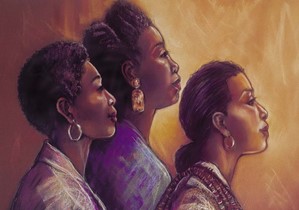By: Kiana Gilcrist 
Research shows that black women are disproportionately impacted by domestic violence.[1] 58 percent of black females who knew their offender were killed by a current or former intimate partner.[2] Further, for women of color and their families experiencing higher rates of poverty and lower rates of financial stability, fewer options for safety exist for them when they are attempting to escape abuse.[3] The discrimination and mistreatment that black people have experienced for the past decades has led to widespread distrust in law enforcement and amplified issues for black people.
The history between law enforcement and communities of color has poured over into the realm of domestic violence. Women of color face significant barriers and face many challenges as a result of domestic violence. There is an extreme distrust of government agencies and law enforcement by black people. This is due, in part, to the fact that these agencies have been used continuously to harass black people or have been used to continually project racist stereotypes.[4] Black people are less likely to call law enforcement due to fears of their partner being brutalized or killed by the police.[5] Black women are more likely to be criminalized, prosecuted, and incarcerated when trying to escape abusive situations,[6] which leads to many declining to involve them at all. Some people think the solution is to have more police in these areas, but more police does not necessarily always translate to better survivor support.[7]
Black women specifically are also often seen as “strong black women,” causing them to have to demonstrate that: 1) [they are] a victim in general and 2) [they are] a victim of domestic violence.[8] But this proves to be difficult. The result of stereotyping and racism in conjunction with the political domestic violence movement’s focus on white women has left the African American victims of domestic violence in a difficult position.[9]
In recent years, many movements have been started to amplify the voices of both domestic violence victims and people of color. The “Defund the Police” movement became a popular, widespread approach, called on to put less money into the police.[10] The police do not protect the women who need it most. The more money that is put into police, the less money that is being invested into community programming and educational services that would dismantle harmful sexist views and reduce violence against women.[11] The movement has a specific focus on the fact that we, as a community, cannot continue putting our trust into an institution that has a long history of belittling women—especially indigenous, Black, trans, mentally-ill and disabled women.[12] The “Black Lives Matter” movement also sparked a call for change. The mission is to eradicate white supremacy and build local power to intervene in violence inflicted on black communities by the state and vigilantes.[13] In June 2020, as a recognition of the countless black lives that had been stolen at the hands and knees of police, several sexual assault and domestic violence state coalitions, signed a document specifically calling for reform.[14] It is time to transform not only oppressive institutions…[and] divestment and reallocation must be accompanied by rigorous commitment to and participation in community solutions.[15]
The development of culturally specific funded organizations would seek to address the issues that black women face when attempting to seek help from their abusers, but racism must be fought within the domestic violence movement and in the legal system in order to successfully help all victims of domestic violence.[16]
[1] Georgia Domestic Violence Fatality Review Project: Improve Access to Culturally Relevant Services for Victims from Marginalized Communities, http://georgiafatalityreview.com/key-goals/improve-access-to-culturally-relevant-services-for-victims-from-marginalized-communities/ (last visited Mar. 29, 2022).
[2] Violence Policy Center (2018).
[3] Id.
[4] Abuse in the Black Community, National Domestic Violence Hotline, https://www.thehotline.org/resources/abuse-in-the-black-community/.
[5] Id.
[6] Id.
[7] Hannah Chinn, Intersecting Issues: Supporting Domestic Violence Survivors, Defunding Police, PBS, (July 22, 2020), https://whyy.org/articles/intersecting-issues-supporting-domestic-violence-survivors-defunding-police/.
[8] Id.
[9] Id.
[10] Paula Ethans, Want to Make Women Safer? Defund the Police, The Tyee, Aug. 26, 2020, https://thetyee.ca/Analysis/2020/08/26/Women-Safer-Defund-Police/.
[11] Id.
[12] Id.
[13] About, Black Lives Matter, https://blacklivesmatter.com/about/.
[14] Moment of Truth, https://1311bb21-2007-e958-d518-813a659f70e7.filesusr.com/ugd/88018b_917d5ba321d34656b6381fea1255fd38.pdf.
[15] Id.
[16] Nancy K. D. Lemon, Excerpt from Expert Witness Report, (2004).